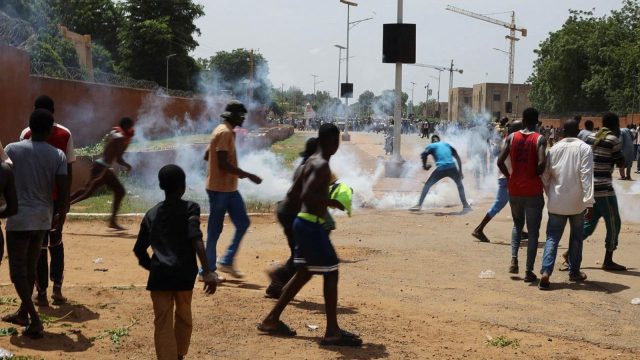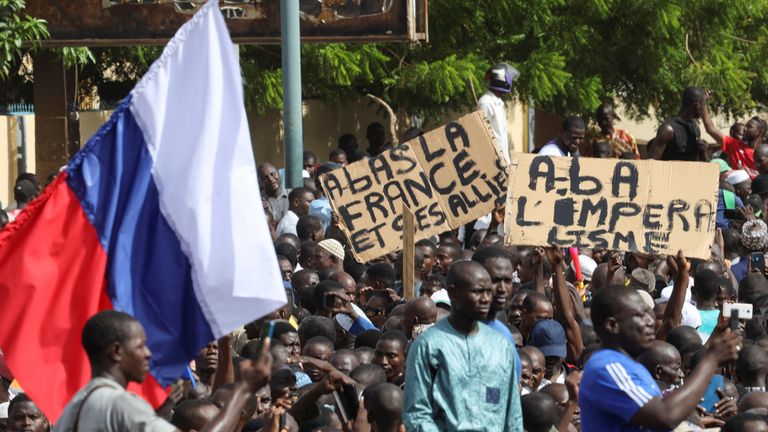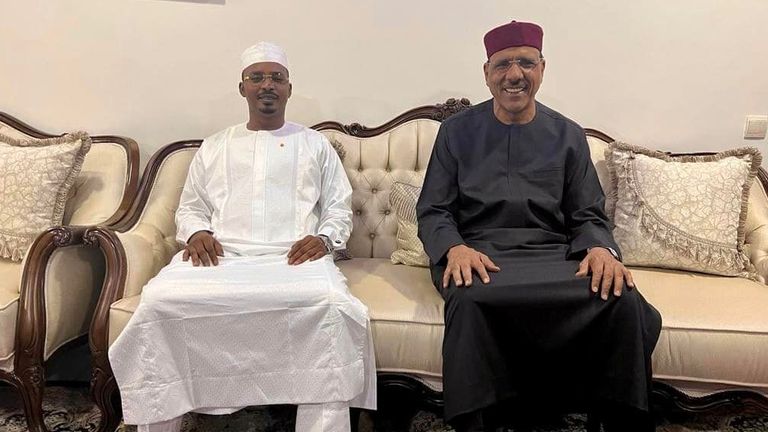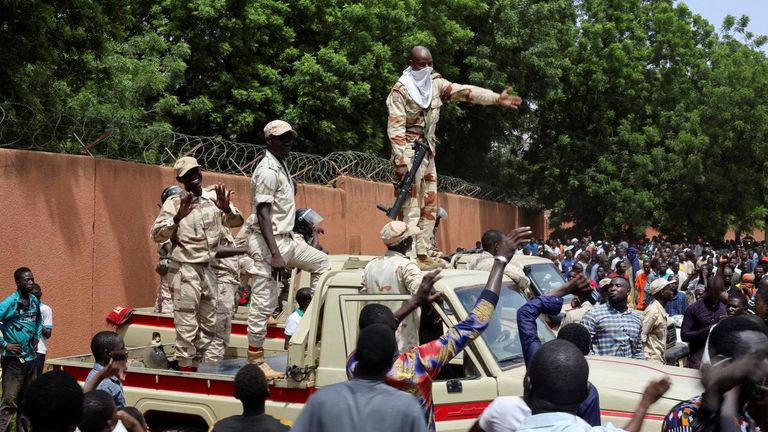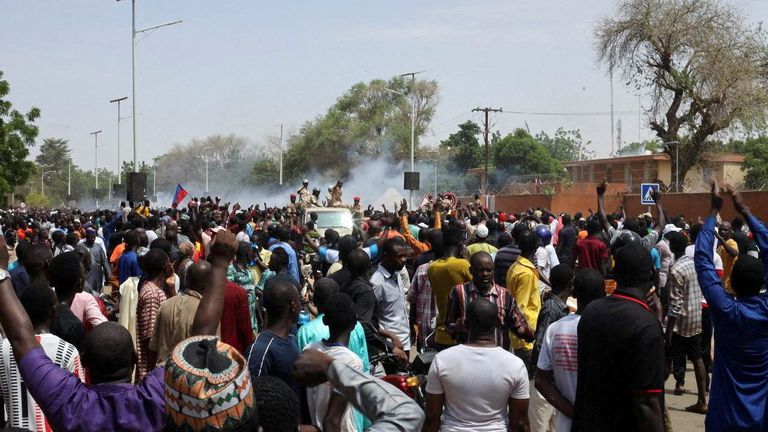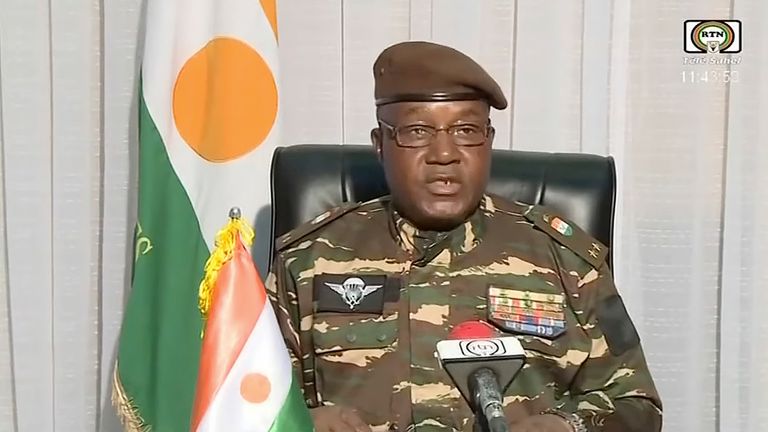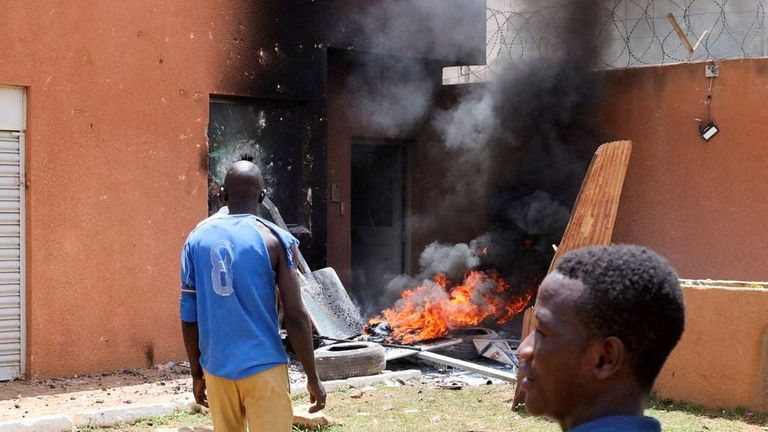Mali and Burkina Faso have warned other West African nations that military intervention in Niger will be considered a declaration of warfare against them.
It comes after Niger’s presidential guard surrounded the palace in the capital Niamey, detained elected president Mohamed Bazoum, and announced a new military government.
The West African regional body – known as ECOWAS – has threatened to use force if coup leaders in Niger do not reinstate the president by the weekend.
But Mali and Burkina Faso, both run by military governments, have warned in a joint statement they will consider any direct intervention in Niger as a “declaration of war” against them.
The two countries – who are both suspended from ECOWAS – have also denounced the regional body’s economic sanctions against Niger as “illegal, illegitimate and inhumane” and have refused to apply them.
ECOWAS suspended all commercial and financial transactions between its member states and Niger, as well as freezing Nigerien assets held in regional central banks, in the wake of the military coup.
Niger – already one of the poorest countries in the world – has also faced cuts to foreign aid from Western nations following the military takeover.
Meanwhile, France and Italy have announced plans to evacuate their citizens from Niger, with officials in Paris also offering to repatriate European nationals.
Mali and Burkina Faso, which neighbour Niger on its western border, have each undergone two coups since 2020. Both are currently suspended from ECOWAS as a result.
The regional body has also imposed sanctions against the two ruling juntas, but has never threatened to use force against them.
Guinea, another country under military rule since 2021, has also shared its support of Niger’s junta and urged ECOWAS to “come to its senses”.
“The sanctions measures advocated by ECOWAS, including military intervention, are an option that would not be a solution to the current problem, but would lead to a human disaster whose consequences could extend beyond Niger’s borders,” said Ibrahima Sory Bangoura, general of the brigade in a statement from the ruling party.
He added the Guinea would not apply the sanctions.
Condemnation from the West
Mr Bazoum was elected two years ago in Niger’s first peaceful, democratic transfer of power since independence from France – and was largely seen as a Western, and regional, ally in West Africa.
On Sunday, anti-government protesters marched through the streets of the capital waving Russian flags and denouncing France.
Demonstrators in Niamey converged on the French embassy and set fire to its doors, stoned the building and burned the country’s flags.
Russian mercenary group Wagner is already operating in neighbouring Mali and its boss Yevgeny Prigozhin has hailed the coup as good news and offered his fighters’ services.
The Kremlin said the situation in Niger is “cause for serious concern”, with spokesperson Dmitry Peskov saying that Russia called for all sides in the coup to show restraint.
The coup in Niger has been widely condemned by neighbours and international partners including the US, the United Nations, the European Union and France.
They have all refused to recognise the new leaders and have demanded the elected president’s return.
Read more:
Coups across the Sahel region explained
How Wagner is providing cover for Putin in Niger
Russia will look on coup ‘very favourably’
France has also announced a planned evacuation from Niger for French and European nationals, citing recent violence outside its embassy in Niamey as one of the reasons for the decision.
The closure of Niger’s airspace also “leaves our compatriots unable to leave the country by their own means,” the ministry said.
Italy’s foreign minister on Tuesday said the government would also arrange a special flight to repatriate nationals from Niamey.
US Secretary of State Antony Blinken commended the resolve of the ECOWAS leadership to “defend constitutional order in Niger” after sanctions were announced.
He also joined the bloc in calling for the immediate release of Mr Bazoum and his family.
On Sunday, one of the leaders of the military coup, Colonel Amadou Abdramane, claimed the ousted government authorised France to carry out strikes to free the president.
He alleged the Niger foreign minister, acting as prime minister, signed the order allowing France to take action.
France – which ruled Niger as a colony until 1960 – has 1,500 soldiers in the country. They had been conducting joint operations with its government, with protesters appearing to be against having foreign military forces in their country.
The now-ruling military has warned foreign governments against trying to free Mr Bazoum, saying it would result in chaos and bloodshed.
France’s foreign ministry refused to confirm or deny that authorisation had been made, telling journalists the only authority it recognises is that of Mr Bazoum.
Development aid suspended by France
Niger is one of the poorest countries in the world, receiving close to $2bn (£1.6bn) a year in official development assistance, according to the World Bank.
It is also a security partner of France and the US, which both use it as a base to fight an Islamist insurgency in West and Central Africa’s wider Sahel region.
Conflict experts say out of all the countries in the region, Niger has the most at stake if it turns away from the West, given the millions of dollars of military assistance the international community has poured in.
France has suspended all development aid and other financial aid for Niger.
The Elysee Palace said in a statement: “Anyone who attacks French nationals, the military, diplomats, or French interests will spur an immediate and uncompromising response from France.”
In the UK, the Foreign, Commonwealth and Development Office said in a statement that Britain “condemns in the strongest possible terms attempts to undermine democracy, peace and stability in Niger”.

